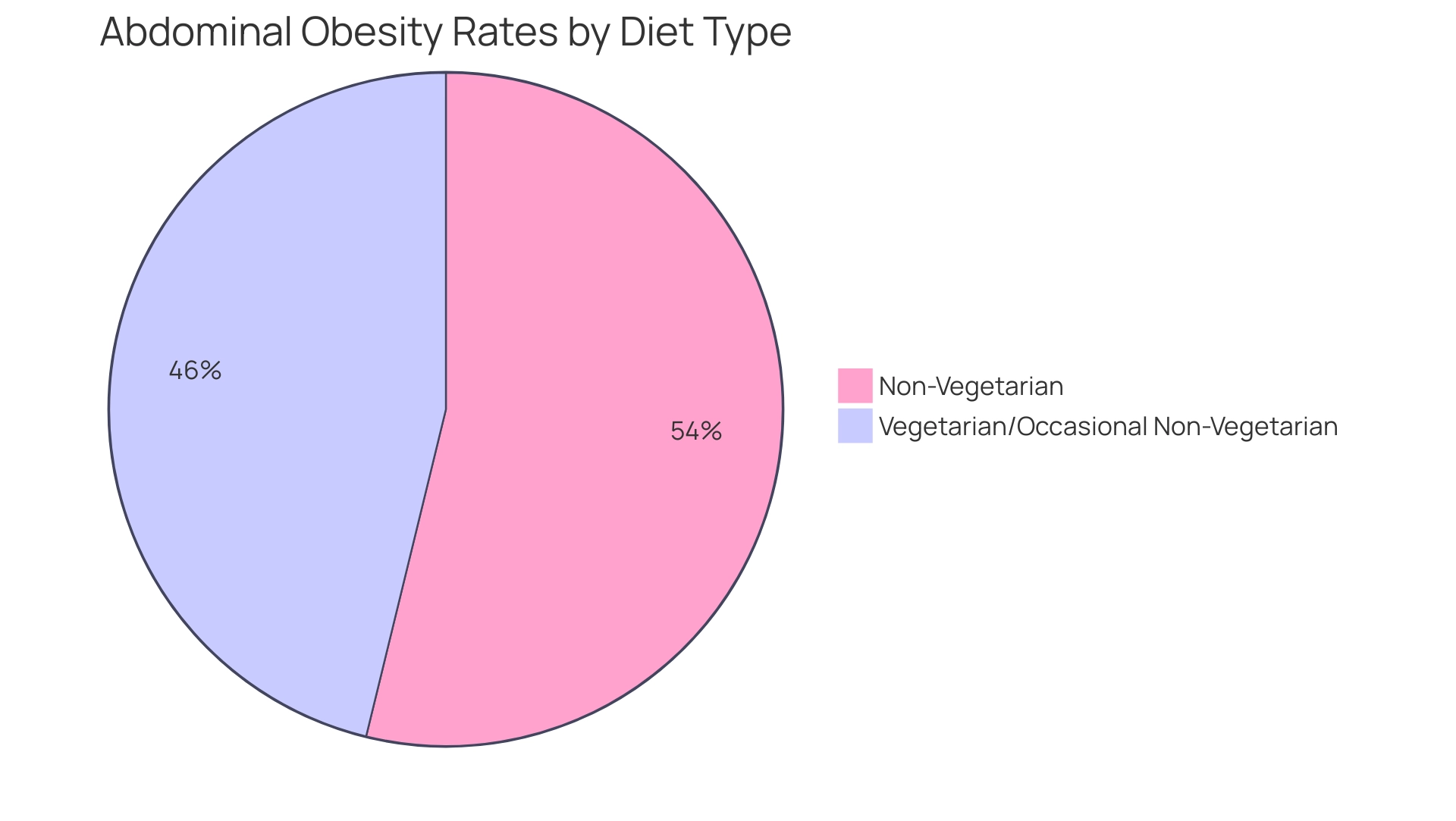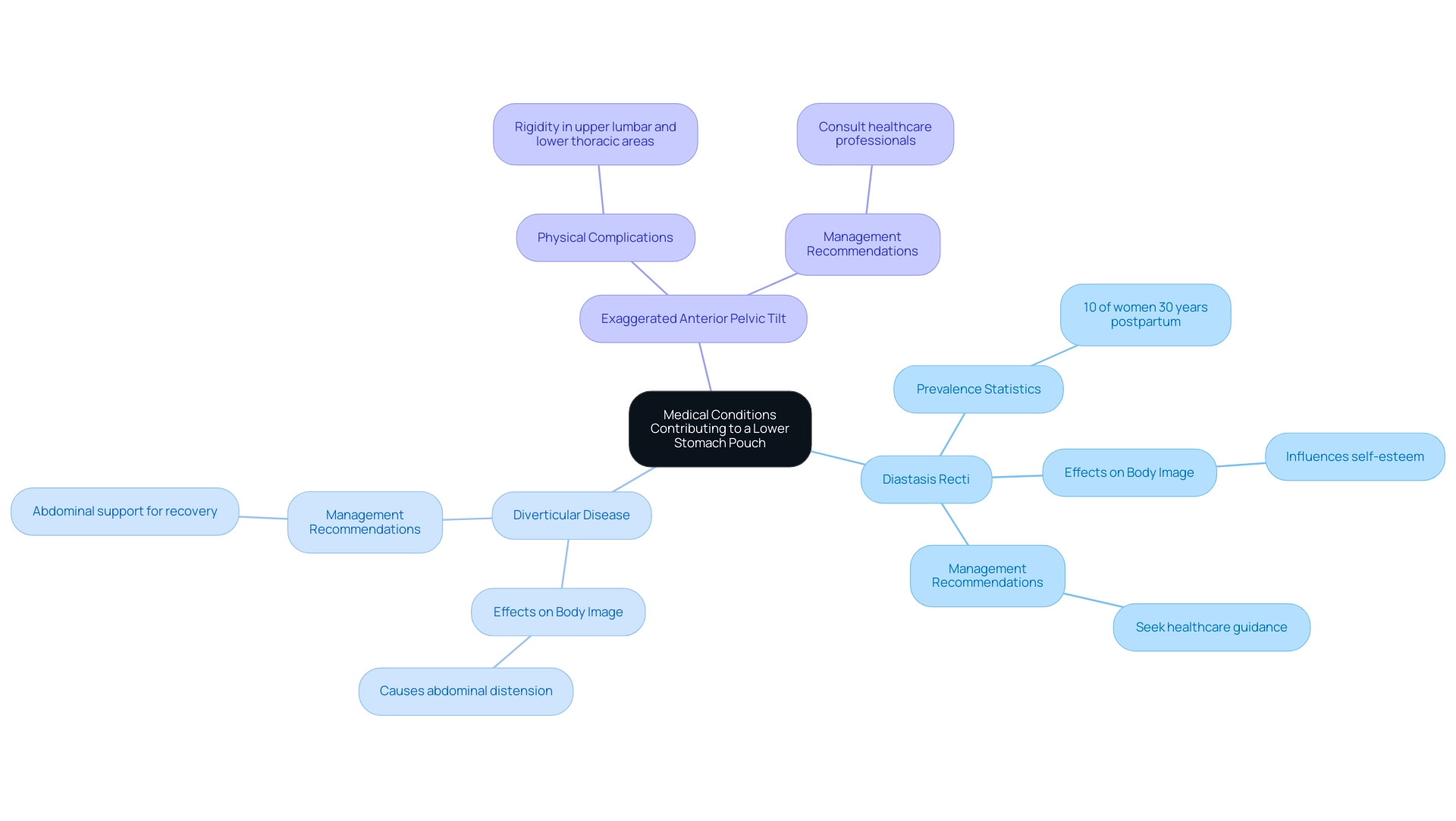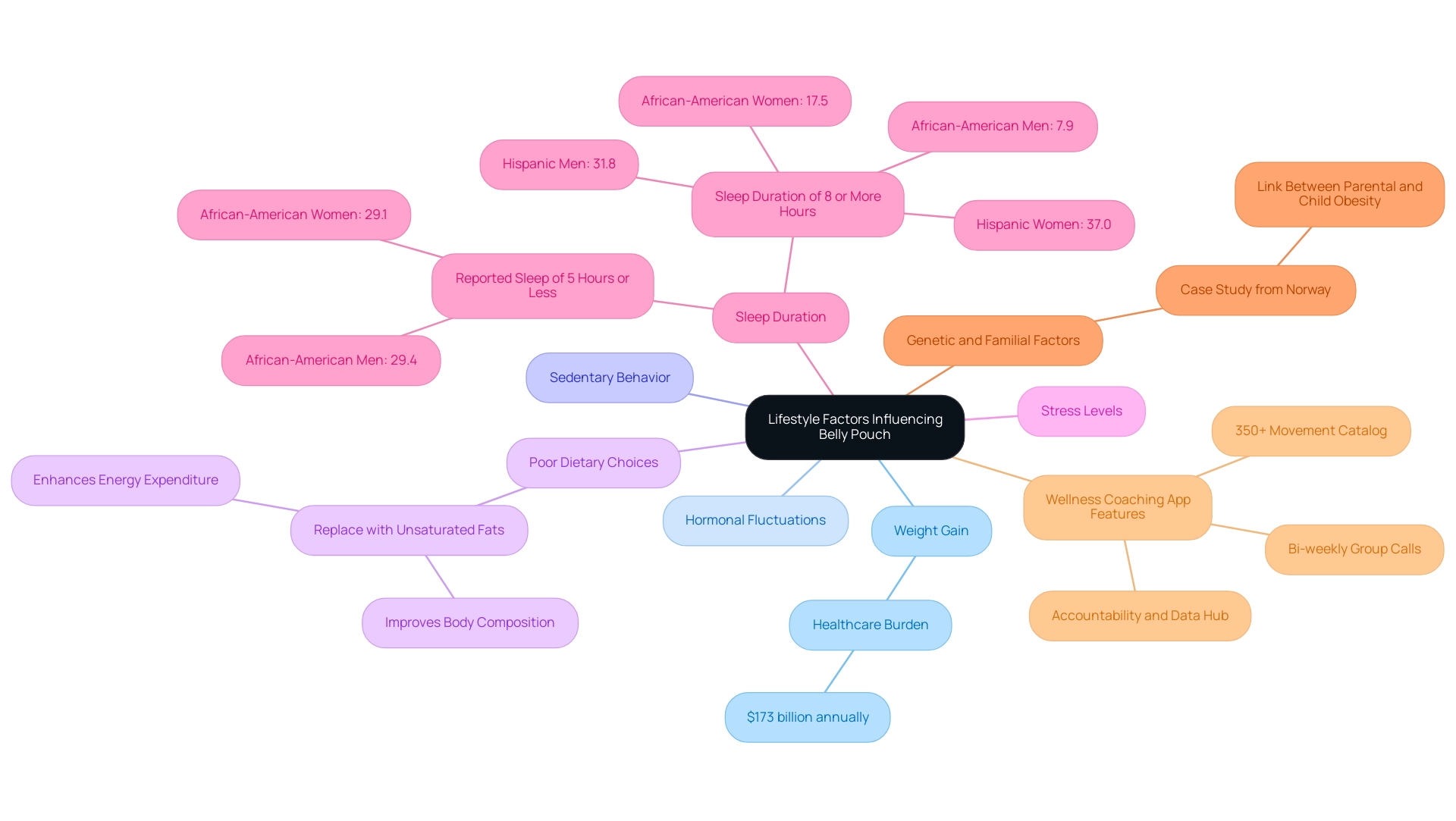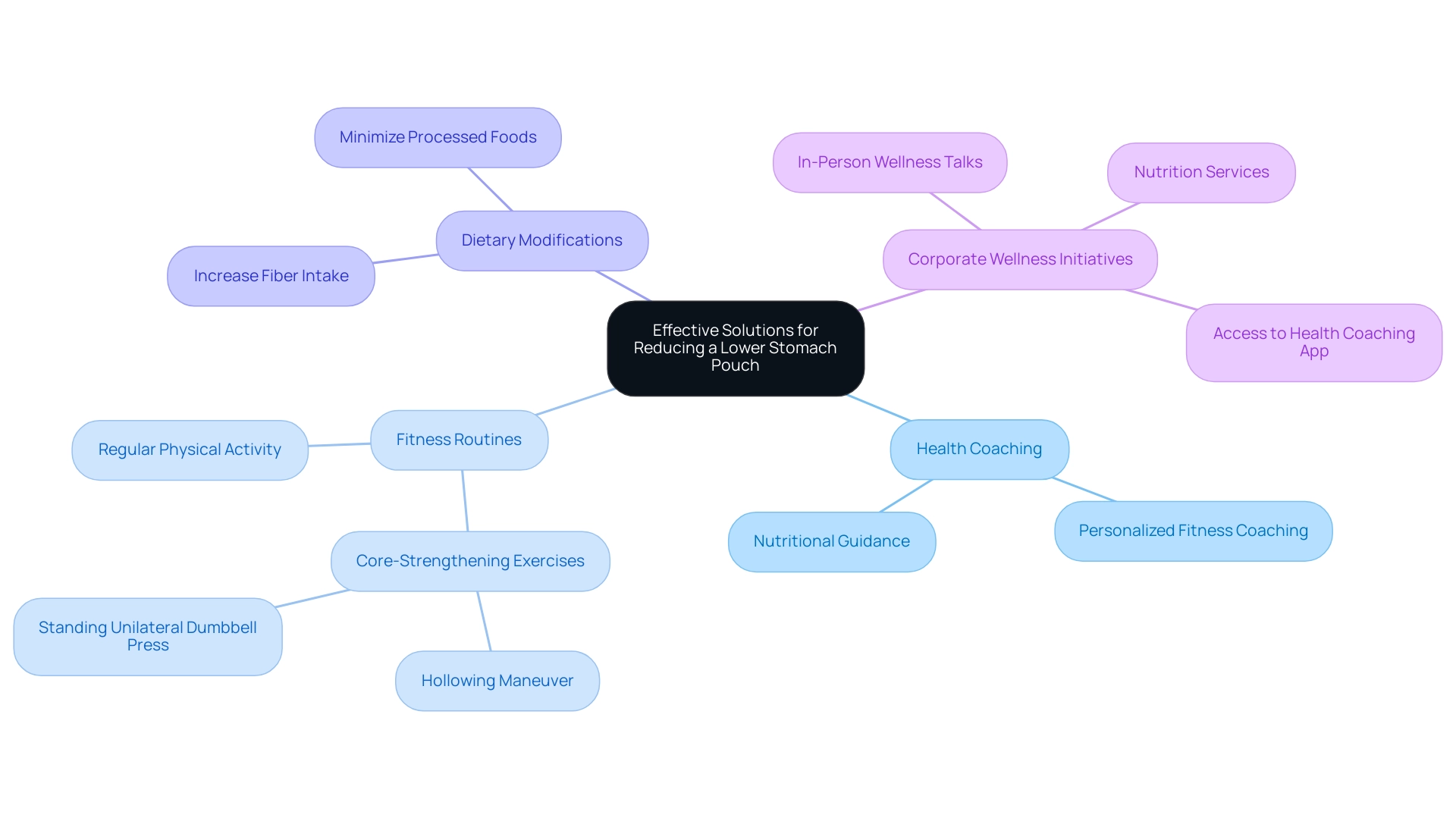Introduction
In a world where body image often takes center stage, the presence of a lower stomach pouch can stir feelings of self-doubt and concern. However, understanding the multifaceted nature of this common phenomenon can empower individuals to embrace their bodies with a more compassionate lens.
From genetic predispositions to lifestyle choices and medical conditions, the factors influencing abdominal appearance are diverse and complex. By shedding light on these elements, individuals can navigate their health journeys with informed perspectives, dispelling myths and misconceptions that often cloud the conversation.
This article delves into the underlying causes of a lower stomach pouch, explores effective solutions for addressing it, and highlights the importance of a supportive community in fostering positive change. Embracing this knowledge paves the way for a healthier, more confident future.
Understanding the Lower Stomach Pouch: Common Concerns and Misconceptions
It’s not unusual for individuals to wonder why do I have a small pouch on my lower stomach and feel a wave of concern or self-consciousness. However, it’s crucial to recognize that this phenomenon is prevalent and can be influenced by a variety of factors, including genetics, body composition, and lifestyle choices. Many people mistakenly believe that a lower stomach pouch is solely a byproduct of poor diet or lack of exercise, leading to the question: why do I have a small pouch on my lower stomach?
In truth, why do I have a small pouch on my lower stomach can also be attributed to natural body variations, hormonal changes, and even stress levels. Recent studies indicate that central obesity is a significant risk factor, with findings revealing that:
- 36.4% of those with a vegetarian or occasionally non-vegetarian diet are abdominally obese, compared to 42.4% of non-vegetarians.
- Fezeu et al. identified central obesity as a key determinant of metabolic syndrome in sub-Saharan Africa, highlighting its broader health implications.
As noted by Monika Chaudhary, the corresponding author on relevant research,
Abdominal obesity is also on the rise in rural areas and is penetrating lower and middle socioeconomic sections of society.
This emphasizes the need for targeted interventions, as illustrated by the case study titled 'Double Burden of Malnutrition in India,' which addresses the emerging health risks associated with abdominal obesity amidst persistent under-nutrition.
Additionally, the prevalence of abdominal obesity is influenced by education level, wealth index, and type of diet, underscoring the complexity of this issue. Understanding these contributing factors enables people to approach their health and wellness journey with a more informed and compassionate mindset, fostering resilience in the face of societal pressures and misconceptions.

Medical Conditions That Contribute to a Lower Stomach Pouch
A variety of medical conditions can contribute to why do I have a small pouch on my lower stomach, affecting not only physical appearance but also overall well-being. One significant condition that answers the question of why do I have a small pouch on my lower stomach is diastasis recti, where the abdominal muscles separate, leading to a noticeable bulge that can affect self-esteem.
Research indicates that the prevalence of diastasis recti (DRA) with an inter-recti distance (IRD) over 3 cm is notably present in 10% of women 30 years postpartum, and Rett et al. (2009) found that this condition is prevalent both in primiparae and multiparae, suggesting that various childbirth experiences can influence its occurrence.
Furthermore, diverticular disease, which affects the colon, can cause abdominal distension, making individuals question why they have a small pouch on their lower stomach, and it is often linked to altered body image. A randomized control trial by Cheifetz and colleagues (2010) emphasizes the importance of abdominal support in managing discomfort and enhancing recovery, particularly for those recovering from surgeries like caesarean deliveries.
Additionally, after pregnancy, some women may develop an exaggerated anterior pelvic tilt, leading to rigidity in the upper lumbar and lower thoracic areas, further complicating their physical recovery. Statistical analyses conducted in studies have reported differences in weight gain, education, and parity between women with and without DRA, enhancing the understanding of risk factors associated with this condition.
It is essential for individuals observing ongoing variations in their body to seek guidance from healthcare professionals.
By understanding these conditions, we not only address the visible issue but also foster a culture of health awareness and proactive management, encouraging everyone to take charge of their well-being.

Lifestyle Factors Influencing the Appearance of a Belly Pouch
Many people wonder why do I have a small pouch on my lower stomach, as its appearance is significantly influenced by various lifestyle factors, including weight gain and hormonal fluctuations. Evidence suggests that as people navigate these changes, particularly post-pregnancy or due to fluctuating hormones, they often ask why do I have a small pouch on my lower stomach, as the impact on body composition can be profound. Current statistics reveal that sedentary behavior, poor dietary choices, and elevated stress levels can contribute to the concerns of why do I have a small pouch on my lower stomach.
For instance, the staggering healthcare burden of $173 billion annually due to obesity underscores the need for proactive measures. Rather than conventional dietary methods, think about using a thorough wellness coaching app that offers personalized assistance through daily workouts, guided nutrition, and mindset strategies customized to specific needs. This app includes:
- A 350+ movement catalog
- Bi-weekly group calls
- An accountability and data hub
Empowering users to take charge of their health journey effectively.
Furthermore, sleep duration plays a critical role in this context, with key data indicating that:
- 29.4% of African-American men
- 29.1% of African-American women
Reported sleeping 5 hours or less, which can contribute to weight gain and lead to concerns such as why do I have a small pouch on my lower stomach. Additionally, a case study from Norway highlights that genetic and familial factors significantly influence obesity risk, emphasizing the importance of understanding both lifestyle and hereditary influences. By dedicating to a more active way of living, including consistent physical activity, and making thoughtful dietary decisions, people can address questions such as why do I have a small pouch on my lower stomach while starting beneficial improvements in their body composition.
With the added benefit of community support through the app, small, consistent adjustments can lead to remarkable improvements over time, enhancing not only physical appearance but also overall well-being. Success stories of individuals who have overcome the challenge of the belly area through dedicated diet and exercise serve as powerful reminders of what is achievable. One user noted, 'After using the app for just a few months, I not only lost weight but also gained confidence and a supportive community.'
It’s time to take action and adopt these lifestyle adjustments for a healthier future.

Effective Solutions for Reducing a Lower Stomach Pouch
To effectively tackle the challenge of a lower stomach pouch, it is important to understand why do I have a small pouch on my lower stomach and to embrace a comprehensive strategy that includes tailored health coaching. At Foresight Health Coaching, we engage clients through personalized fitness coaching programs and app-based delivery, ensuring lasting lifestyle changes. Regular physical activity, particularly core-strengthening routines, enhances muscle tone and supports abdominal health.
Notably, a study by McGill & Marshall (2012) demonstrated the positive impact of free-weight activities on muscle thickness, emphasizing the role of effective movements in achieving desired results. Specifically, the hollowing maneuver resulted in a statistically significant increase in muscle relative thickness compared to the bracing maneuver for all three muscles (p < 0.001), highlighting its effectiveness. Including routines such as the standing unilateral dumbbell press, which achieved 0.4 mV in the external oblique, can contribute significantly to overall core stability.
As Eleftherios Kellis stated in his study, 'A Comparison between Core Stability Exercises and Muscle Thickness Using Two Different Activation Maneuvers,' understanding the nuances of these exercises is crucial for optimal results.
In parallel, dietary modifications are crucial in fostering a healthier gut and reducing bloating. Experts recommend minimizing processed foods while boosting fiber intake to create a balanced diet. Nutritionists consistently advocate for these dietary changes, citing their effectiveness in alleviating bloating symptoms and enhancing overall well-being.
At Foresight Health Coaching, our nutritional guidance is designed to support these dietary modifications, providing clients with tailored advice to optimize their eating habits. Success stories abound of people who have transformed their abdominal appearance through dedicated dietary efforts.
Furthermore, our corporate memberships offer a comprehensive approach to wellness, including in-person wellness talks, nutrition services, and access to our exclusive app, making it easier for organizations to implement these health initiatives for their teams. Ultimately, it's about discovering a harmonious mix of physical activity and nutrition tailored to individual needs. The journey to a healthier abdomen may require small adjustments, especially when considering why do I have a small pouch on my lower stomach, but the rewards can be substantial.
With Foresight Health Coaching, whether through core-strengthening exercises or mindful dietary choices, every step taken contributes to improved health and vitality for your team. Contact us today to learn more about how our programs can enhance your workplace wellness initiatives.

Conclusion
Understanding the factors that contribute to the appearance of a lower stomach pouch is vital for fostering a positive body image and overall well-being. From genetic influences and medical conditions to lifestyle choices, this multifaceted issue requires a compassionate and informed approach. Recognizing that conditions like diastasis recti and diverticular disease can impact abdominal appearance helps individuals address their concerns with greater awareness and proactivity.
Moreover, lifestyle factors such as diet, exercise, and stress management play a crucial role in shaping body composition. Emphasizing the importance of personalized wellness strategies, including tailored fitness coaching and dietary modifications, can significantly aid in reducing the lower stomach pouch. The integration of technology, such as wellness apps, provides essential support and community, empowering individuals to make sustainable changes in their health journeys.
Ultimately, embracing a holistic approach that combines education, lifestyle adjustments, and community support not only enhances physical appearance but also promotes a healthier mindset. By prioritizing these elements, individuals can cultivate resilience against societal pressures and misconceptions, paving the way for a more confident and empowered future. Now is the time to take action, fostering a culture of health awareness and proactive management that benefits everyone involved.
Frequently Asked Questions
Why do I have a small pouch on my lower stomach?
A small pouch on the lower stomach can be influenced by various factors, including genetics, body composition, lifestyle choices, natural body variations, hormonal changes, and stress levels.
Is a lower stomach pouch solely caused by poor diet or lack of exercise?
No, many people mistakenly believe this. While diet and exercise play a role, other factors like hormonal changes and genetics also contribute to the presence of a lower stomach pouch.
What is central obesity, and why is it significant?
Central obesity refers to excess fat accumulation around the abdomen. It is a significant risk factor for metabolic syndrome and has health implications, as highlighted by research indicating high prevalence rates in different dietary groups.
What percentage of individuals with a vegetarian or occasionally non-vegetarian diet are abdominally obese?
36.4% of those with a vegetarian or occasionally non-vegetarian diet are abdominally obese.
How does the prevalence of abdominal obesity vary between vegetarians and non-vegetarians?
The prevalence of abdominal obesity is 42.4% among non-vegetarians, compared to 36.4% among vegetarian or occasionally non-vegetarian individuals.
What broader health implications are associated with abdominal obesity?
Abdominal obesity is rising in various socioeconomic groups and is linked to emerging health risks, as noted in studies addressing the double burden of malnutrition.
What factors influence the prevalence of abdominal obesity?
The prevalence of abdominal obesity is influenced by education level, wealth index, and type of diet, reflecting the complexity of the issue.
How can understanding these factors help individuals?
Understanding the contributing factors to abdominal obesity enables individuals to approach their health and wellness journey with a more informed and compassionate mindset, helping them resist societal pressures and misconceptions.

